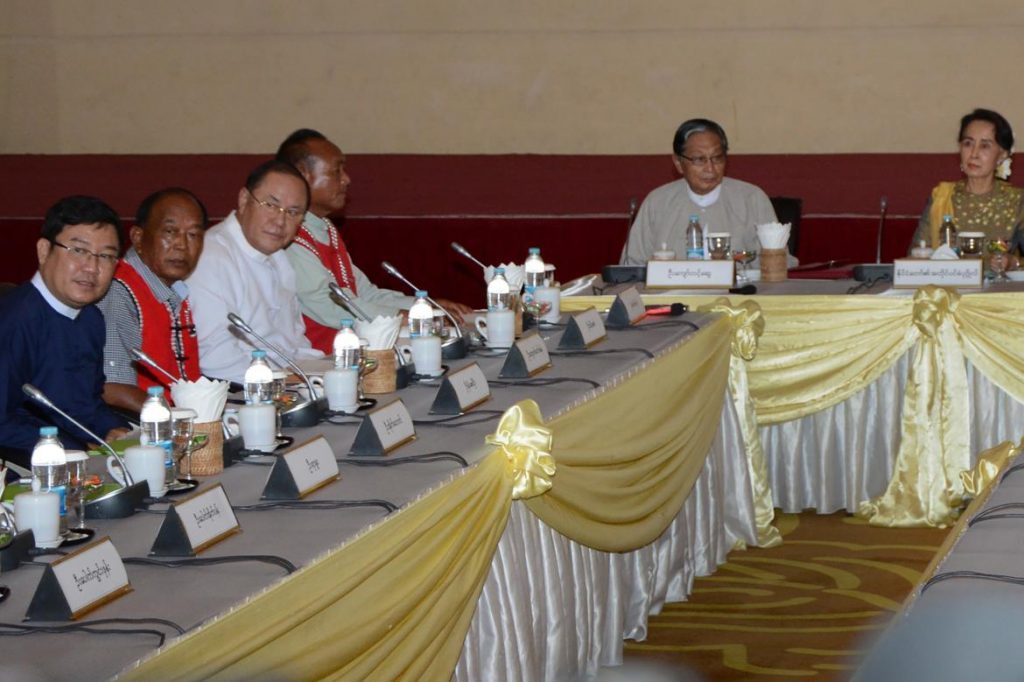The United Wa State Army has lambasted the peace process in a paper circulated ahead of a meeting it called of ethnic armed groups that are yet to sign the 2015 national ceasefire accord.
By SITHU AUNG MYINT | FRONTIER
FROM February 21 to 23, the United Wa State Army hosted ethnic armed groups at its headquarters at Panghsang, in northeastern Shan State, for a summit on the peace process.
The groups at the meeting included the Kachin Independence Army and other non-signatories of the so-called Nationwide Ceasefire Agreement that was inked by eight armed ethnic organisations in 2015.
About a month before the summit, the USWA circulated among invited groups a 22-page paper outlining its attitude towards the NCA and the peace process under State Counsellor Daw Aung San Suu Kyi. The UWSA called the summit to discuss the policies the groups would need to uphold in any negotiations with the government. The opinions expressed in the paper by the UWSA – the country’s most powerful ethnic armed group, with an estimated 30,000 troops – amount to a major challenge to the peace process.
The paper is strongly critical of Aung San Suu Kyi’s handing of the peace process since the National League for Democracy government came to power late last March. It notes that a succession of former governments have failed in their attempts to achieve peace. The previous U Thein Sein administration launched the peace process but as it was based on all ethnic armed groups signing the NCA it was not successful.
Support more independent journalism like this. Sign up to be a Frontier member.
Ethnic minorities had high hopes for the peace process under Aung San Suu Kyi, the paper said. But the peace process that she was trying to implement did not benefit ethnic nationalities, it said, attributing this to the fact that she is a member of the majority Bamar ethnic group.
The paper also criticises the 21st Century Panglong Union Peace Conference model and the use of the term “Panglong spirit” to promote the peace talks. It said the “Panglong spirit” espoused by the state counsellor was different to that represented in the 1947 Panglong Agreement, a formula for federalism signed by General Aung San and Chin, Kachin and Shan leaders.
The right to secede was not included in Aung San Suu Kyi’s “Panglong spirit”, it said. It also criticized the NCA, saying it served neither a military nor a political purpose and was open to interpretation. This enabled the Tatmadaw to interpret the NCA according to its wishes, the paper said.
The NCA has divided ethnic armed organisations into three broad groups. The first comprises the eight signatories, the most important of which is the Karen National Union. The second group is headed by the KIA, which wants the NCA to be amended. The third group, which includes the UWSA, supports a three-level peace process that the Wa group had been negotiating with the previous government before the NCA was proposed.
The paper said that “the Burmese” were trying to replace the Panglong Agreement with the NCA. This was why the Burmese were putting pressure on the UWSA to sign the NCA, the paper said. It proposed that the UWSA and other groups that have not signed the NCA form a new group to demand their rights in the peace process to counter the demands of the Burmese.
The UWSA’s paper amounts to a rejection of the peace process under Aung San Suu Kyi, and to having to sign the NCA as a precondition for participation.
The UWSA did not sign the NCA on the grounds that it signed bilateral ceasefires with the junta in 1989 and the Thein Sein administration in 2011. As it had not been involved in fighting, there was no need to sign the NCA, it had argued, though it made its objections quietly.
This has changed and it is now criticising both the NCA and the peace process under Aung San Suu Kyi.
It seems as if the UWSA is manoeuvering to get other non-signatory groups to support its push for new negotiations with the government.
There is a reason for that. If Aung San Suu Kyi was to be successful in persuading non-signatory groups, including the KIA, to sign the NCA and bring them into the 21st Century Panglong Union Peace Conference process, the UWSA would be isolated.
Its long-running demand for what would virtually be independent status would be unacceptable not only to the government, but also to other ethnic minorities. It is that possibility which has encouraged the UWSA to venture into national-level politics.
If the UWSA was to succeed in persuading the KIA and other non-signatories to support its stand, as it appears has happened in the aftermath of the February Panghsang meeting, it would create a serious problem for the 21st Century Panglong peace process and be a big setback for the NCA and the efforts to settle a political problem through political means.



